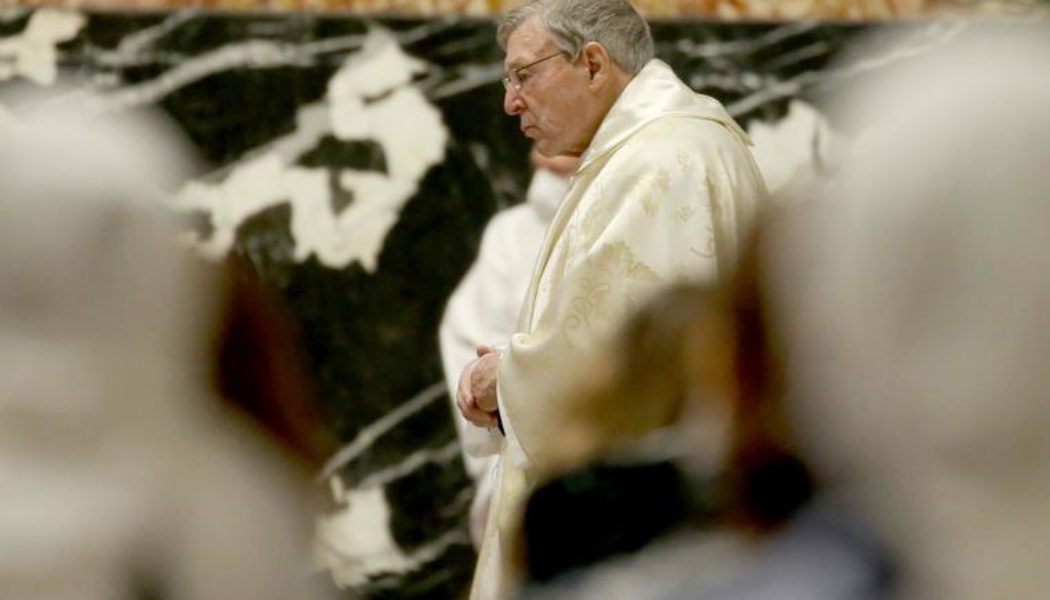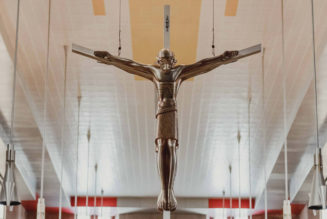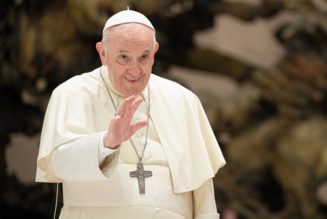
The St. Paul Center for Biblical Theology — founded by Scott and Kimberly Hahn and Mike Aquilina — is celebrating its 20th anniversary on Thursday in Orlando, Florida, by honoring Cardinal George Pell.
Cardinal Pell will join the gala virtually, offering a reflection on Philippians, inspired by his wrongful conviction and imprisonment.
The St. Paul Center has had immense influence in promoting its mission of “Reading the Bible from the Heart of the Church,” leading a genuine revival in biblical preaching and knowledge at the parish level.
Cardinal Pell’s honor comes as the third volume of his prison diary is published. Prison Journal: The High Court Frees an Innocent Man is newly-released by Ignatius Press. The honor from the St. Paul Center is a suitable occasion to consider Cardinal Pell as a biblical commentator. He is not known principally as such, but the publication of his Prison Journal provides us with many biblical reflections.
The cardinal’s journal details the progress of his case and describes his life in solitary confinement, but also includes the news about Aussie rules football, books he is reading — War and Peace was one — visits from friends, snippets from the thousands of letters he received, comments on the preaching of televangelists — including a surprisingly favorable assessment of Joel Osteen — and the television programs he watched.
There are near-constant references to the weather, indicating the extent to which Cardinal Pell’s world had shrunk. Confined to his cell in solitary confinement for the vast majority of the day, his exercise periods in the yard were the only chance to stretch his legs and get a change of place. Hence the weather mattered a great deal; inclement weather could mean an entire day in his cell.
There is the kind of reminiscing that journal-writing prompts when time is at hand, like his “gardening digression” on his planting of jacaranda trees at Cathedral House in Sydney.
The range of the journal will inform, enrage, amuse, educate, console, amuse and occasionally puzzle the reader.
Yet the spiritual heart of Prison Journal is Cardinal Pell’s reflections on the Breviary, especially the longer daily texts from the Office of Readings, one biblical and the other usually from a Church father or saint. Denied the opportunity to offer the Holy Mass while incarcerated, the Breviary was Cardinal Pell’s connection to the liturgical life of the Church. Thus in many entries, he would comment upon the readings, sharing a lifetime of reflecting upon the Divine Office.
To whet the reader’s appetite for Volume 3, I might share some of the pages which most interested me in Volume 2. I was ordained a priest on July 20, the feast of the prophet Elijah, and so have a greater devotion to him than other Old Testament figures. I learned that I shared that with Cardinal Pell.
“Elijah has returned,” the cardinal writes for July 14, 2019. “Not as John the Baptist, but in excerpts from the Book of Kings which will run in the breviary as the first reading for the next week.”
“He is one of my heroes” he writes. “I have a beautiful 200-year-old Russian icon of Elijah in my private chapel in Rome and I revere him because he saved monotheism when it risked being eclipsed by paganism, in this case by Baal.”
“It is not enough to be spiritual in a sentimental, episodic fashion, because we are called to acknowledge and love the one true God,” Cardinal Pell writes. Few have accused him of being sentimental.
“Immense consequences follow in daily life from the presence or absence of monotheism, as we are beginning to see in Western societies as God is obscured.”
Cardinal Pell the controversialist is rarely on display in Prison Journal, though he often applies the biblical lessons to the present day — as well as to periods in Church history, a subject of great interest to him.
“Elijah told God that, despite all his efforts, he was the only remaining prophet of the Lord, the God of hosts,” Cardinal Pell comments. “That was enough, because God sent him to anoint Hazael as King of Syria, Jehu as King of Israel, and Elisha as his successor. … St. John Fisher, like Elijah, spoke truth to power. A martyr, he was the only English bishop to reject Henry VIII’s attempt to make himself head of the Church in England.”
For that day, July 17, 2019, Cardinal Pell concludes with a prayer, as he does most days. This time it is from St. John Fisher’s prayer for holy bishops: “The apostles were but soft and yielding clay till they were baked hard by the Holy Ghost. So, good Lord, do now in like manner again with thy Church militant; make the soft and slippery earth into hard stone; set in thy Church strong and mighty pillars. Amen.”
For the feast of Elijah, July 20, Cardinal Pell gives his most extended commentary, though he concedes that “as I never anticipated writing on this incident, I haven’t read any exegetes, believers or unbelievers, to deepen my understanding.”
Noting that Elijah spent “a good deal of his life on the run, fleeing the grasp of hostile powers,” he notes a lesson for us today, for those “who love the Church [and] are grieved by the decline in Mass-going and the formal departures from the community.”
“These are sad developments, which we must resist in every way possible, natural and supernatural. Sometimes our sins have accelerated the exodus,” Cardinal Pell writes. “But one worse alternative exists, that pagan teachings merge into and replace the official doctrines of the Christian churches. Monotheism melts away into spirituality, respect for Mother Earth, and rediscovery of the ancient pagan religions.”
“Such a virus will not take over the Catholic Church,” Cardinal Pell confidently writes. But it will do its damage. “Tragically, it is often spread by Christians who believe that unless the churches adopt some or more of these teachings, modernize, and go along with the times, then the churches will continue to slip into oblivion. … This is a double mistake. Christians are not free to reject or rewrite the apostolic tradition.”
Elijah was not imprisoned — though he would have been if he had been caught. But he was more or less alone.
Cardinal Pell was imprisoned but he was certainly not alone, as his Prison Journal testifies to the enormous support he received. Yet the two shared a clarity about fidelity to God in the midst of travails.
As Cardinal Pell writes, “Elijah would not be pleased with this grim spectacle, these debacles, but he would not be surprised.”
Join Our Telegram Group : Salvation & Prosperity









